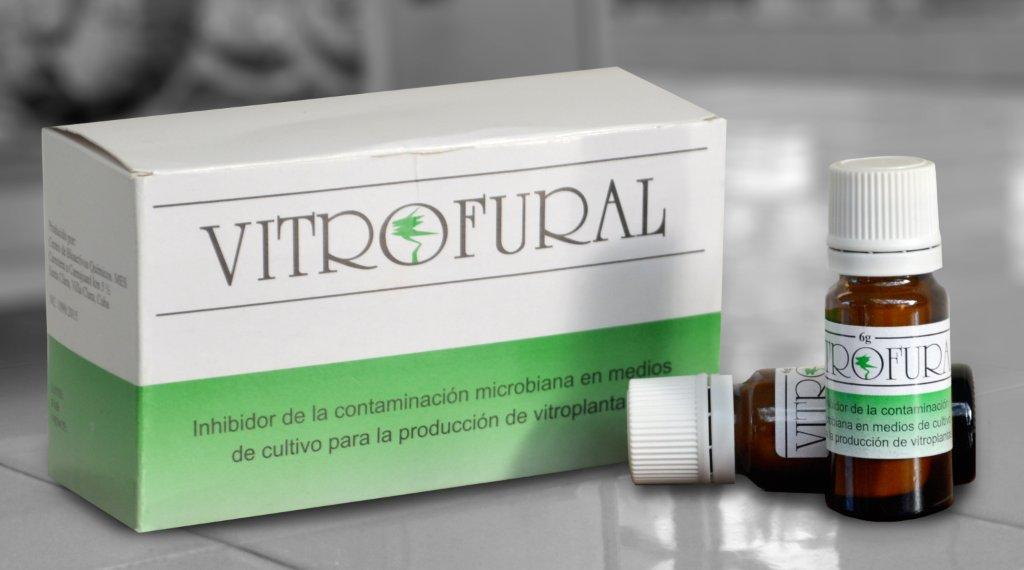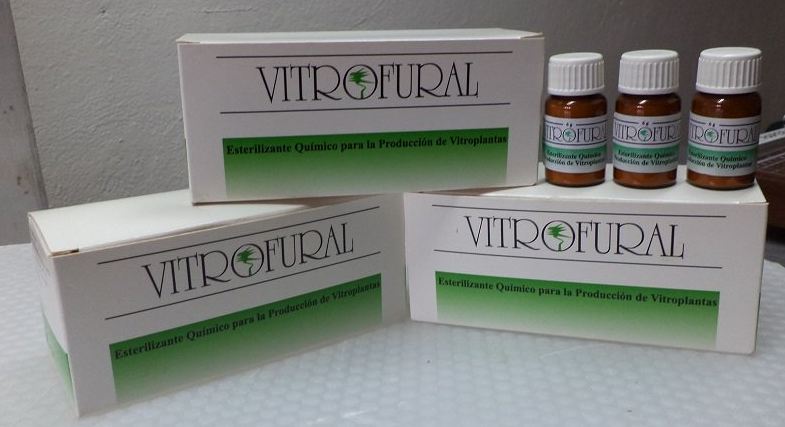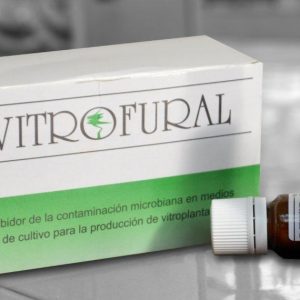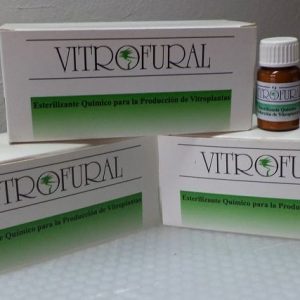



VITROFURAL® is presented as a microbe contamination inhibiter in cultivation media for the massive production of vitro-plants, replacing the conventional process of autoclave sterilization. It is bottled in amber-colored 6 g. vials, with screwed on plastic lids, and in cardboard box secondary containers holding 10 vials. The recommended concentration for VITROFURAL ® in the cultivation medium is 116 mg/L, therefore with 6 grams, 50 L of cultivation medium can be prepared. The expiration date is 5 years from the date of manufacture, keeping it away from the light and damp. The product is accompanied by a declaration of conformity with its quality specifications, correctly elaborated and implanted according to Cuban norm NC 1090:2015.
VITROFURAL ® was registered in Cuba with permit number 013/99 in 1999, where its use has become extensive in all bio-factories belonging to the company producing and commercializing seeds for the Ministry of Agriculture, as well as in agricultural biotechnology centers such as the Centro de Bioplantas and the Instituto de Biotecnología de las Plantas (IBP), with excellent results in the micro-propagation of potatoes, bananas, papaya, plantains, sugar cane, pineapple, taro and forestry products, etc. Its efficacy has been verified in 29 Latin American laboratories in cultivation media for potatoes, plantains, garlic, citrus fruits, cherries, cranberries, chrysanthemums and sugar cane. Currently the product is being used in institutions in Mexico, Chile, Peru, Ecuador and Brazil, an evident demonstration of the advantages represented by its use, as compared to the traditional method of autoclave sterilization.
The success of biotechnological plant propagation systems depends to a large extent on the control and prevention of contamination by microbes, something that is still one of the principal and most severe problems for plant micropropagators in the world. In the struggle to prevent or eliminate contamination by microbes in the in vitro cultivation of plants, different alternatives have be tried and put into practice. These go from increasing aseptic measures and the treatment of donor plants, to subcultures of seedlings in the cultivation medium with synthetic or natural anti-microbe products.
Research developed by the Chemical Bioactives Center of the Marta Abreu Central University of Las Villas(Cuba) had the result of obtaining a formula going by the commercial name of VITROFURAL®, a solid dispersion containing 1-(5-bromo-fur-2-il)-2-bromo-2-nitroetene (Furvina) as the active pharmaceutical ingredient to 30 %; its first characteristic is that it has a broad range bactericidal and fungicidal effects, proven in the principal contaminant that presented in in vitro cultivation, in concentrations not exceeding 35 mg/L of the active pharmaceutical ingredient. The other great advantage of this product, the one that has been the most important limiting element for the use of other chemical sterilizers, is that it presents no phytotoxic effects on the concentration controlling contamination.
The Plant Biotechnology Institute (Villa Clara, Cuba) is the referential bio-factory and it offers courses and training sessions that include training in the use of VITROFURAL ® as one of the ways to increase efficiency in plant micropropagation processes. It also provides technical consultancy for the introduction of VITROFURAL ® thereby guaranteeing satisfactory results in the producer’s facilities.
Address: Camajuaní Road, km 5½ , Santa Clara, Villa Clara, Cuba.
Phones: (53) 42281192, 42281473, 42281130
CEO: Dra. Zenaida Rodríguez Negrín
E-mail: zenaidar@uclv.edu.cu
Commercial Specialist: MSc. Raquel Hernández González
E-mail: raquelf@uclv.edu.cu
Website: www.cbq.uclv.edu.cu
Find us:
Marta Abreu Central University of Las Villas
Address: Camajuaní Road, km 5½ , Santa Clara, Villa Clara, Cuba. 54 830
Phone: (53) 42281693
E-mail: info@ibp.co.cu
Website: www.ibp.co.cu